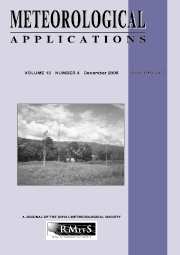Article contents
The mushroom configuration in water vapour imagery and operational applications
Published online by Cambridge University Press: 01 June 1999
Abstract
This paper deals with ‘mushroom-shaped’ patterns that may be observed in water vapour (WV) imagery. Its associated conceptual model has been adapted from the ‘T’ configuration. For this model some remarkable properties of WV imagery have been used: the spatial and temporal continuity of atmospheric structures, the more detailed upper-level circulation features and the possibility of observing and monitoring relationships between them. Using this model, and from the kinematic viewpoint, it is possible to infer some features such as deformation zones, rotation centres (vorticity centres) and relative maxima of wind in the upper-middle-level flows. Some examples are presented to show the usefulness of this conceptual model for the interpretation of WV imagery, the diagnosis of upper-middle-level flow and the evaluation of the numerical model.
- Type
- Research Article
- Information
- Copyright
- © 1999 Meteorological Society
- 4
- Cited by


